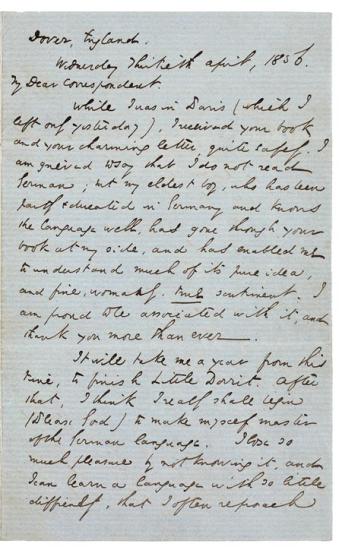
Autograph letter signed, Dover, 30 April 1856 to Sophie Verena
Purchased for The Dannie and Hettie Heineman Collection as the gift of the Heineman Foundation, 2011
This is an extraordinarily candid and personal letter to the young German novelist Sophie Verena, the pen name of Sophie Alberti, who dedicated her first novel to Dickens. Although it states: "I very seldom write or talk about myself," Dickens's letter describes in detail his physical appearance, exercise regimen, and writing habits. Asked whether he dictates his work, he tells Verena: "I answer with a smile that I can as soon imagine a painter dictating his pictures. No. I write every word of my books with my own hand.... I write with great care and pains (being passionately fond of my art, and thinking it worth any trouble)."
Manuscripts and Letters
The Morgan has the richest collection of Dickens manuscripts and letters in the United States. Dickens's letters are exceptionally brilliant and entertaining, and with his literary manuscripts, provide great insight into his craftsmanship and imagination, giving us the closest view of the novelist at work.
Dickens was careful, methodical, and painstaking in his work. Using a goose quill pen, he generally wrote from ten o'clock each morning until two in the afternoon, completing between two and four pages (or "slips," as he called them) each day. Except for letters, he wrote on only one side of the paper. In his early years, he favored black ink, now faded to brown, but in the late 1840s he switched to blue paper and blue ink, which dried more quickly. The handwriting in his early manuscripts is fluent, bold, and largely free of correction, suggesting "a hand racing to keep pace with the mind's conceptions." But, as he developed as an artist, his handwriting became increasingly small and compact, and his later manuscripts are more heavily revised and complex in appearance.
My Dear Correspondent.
While I was in Paris (which I left only yesterday), I received your book and your charming letter, quite safely. I am grieved to say that I do not read German; but my eldest boy, who has been partly educated in Germany and knows the language well, has gone through your book at my side, and has enabled me to understand much of its pure idea, and fine, womanly, true sentiment. I am proud to be associated with it, and thank you more than ever.
It will take me a year from this time, to finish Little Dorrit. After that, I think I really shall begin (Please God) to make myself master of the German language. I lose so much pleasure by not knowing it, and I can learn a language with so little difficulty, that I often reproach
